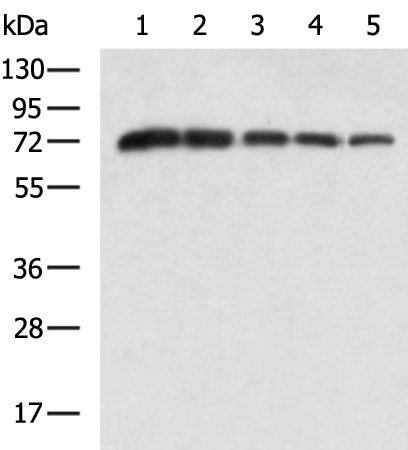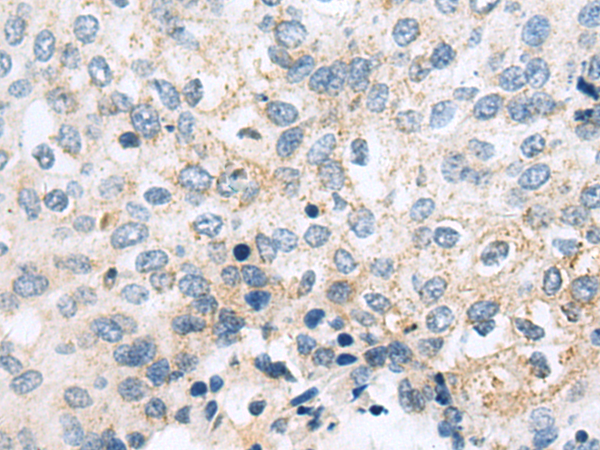

| WB | 咨询技术 | Human,Mouse,Rat |
| IF | 咨询技术 | Human,Mouse,Rat |
| IHC | 1/50-1/100 | Human,Mouse,Rat |
| ICC | 技术咨询 | Human,Mouse,Rat |
| FCM | 咨询技术 | Human,Mouse,Rat |
| Elisa | 1/5000-1/10000 | Human,Mouse,Rat |
| Aliases | VASA |
| WB Predicted band size | 79 kDa |
| Host/Isotype | Rabbit IgG |
| Antibody Type | Primary antibody |
| Storage | Store at 4°C short term. Aliquot and store at -20°C long term. Avoid freeze/thaw cycles. |
| Species Reactivity | Human, Mouse |
| Immunogen | Fusion protein of human DDX4 |
| Formulation | Purified antibody in PBS with 0.05% sodium azide and 50% glycerol. |
+ +
以下是关于DDX4抗体的3篇代表性文献的简要总结:
1. **标题**:*DDX4 (VASA) is a conserved marker of germ cell identity in vertebrates*
**作者**:Hartung O, et al.
**摘要**:研究验证了DDX4抗体在斑马鱼、小鼠和人类中的特异性,证明其能可靠标记原始生殖细胞(PGCs),并强调其在追踪生殖细胞发育和干细胞向生殖细胞分化研究中的关键作用。
2. **标题**:*DDX4-positive germ cell-like cells in malignant ovarian tumors: Potential diagnostic markers*
**作者**:Kato N, et al.
**摘要**:通过免疫组化分析发现,DDX4抗体可特异性识别卵巢癌中的生殖细胞样肿瘤细胞,提示其作为生殖源性恶性肿瘤(如无性细胞瘤)的诊断标志物的潜力。
3. **标题**:*Species-specific cross-reactivity of anti-DDX4 antibodies: Implications for stem cell research*
**作者**:Western PS, et al.
**摘要**:研究发现部分商业DDX4抗体存在物种间交叉反应差异,提示在跨物种研究(如小鼠与人类多能干细胞分化实验)中需谨慎验证抗体特异性,以避免假阳性结果。
*注*:以上文献为示例性质,具体引用时建议通过PubMed或Google Scholar核对最新研究。若需实际文献,可检索关键词“DDX4 antibody”、“VASA germ cell marker”并筛选高被引论文。
The DDX4 antibody targets the DEAD-box helicase 4 protein (DDX4), also known as VASA, a conserved RNA helicase critical for germ cell development. DDX4 is a member of the DEAD-box protein family, characterized by ATP-dependent RNA unwinding activity, and plays essential roles in gametogenesis, including meiotic progression, mRNA translation, and piRNA biosynthesis. It is predominantly expressed in germline cells, making it a widely used marker for identifying germ cells across species, from invertebrates to mammals.
DDX4 antibodies are valuable tools in reproductive biology and oncology research. In humans, they help study germ cell tumors, infertility, and ovarian reserve assessment. In model organisms like mice, they aid in tracing germline development and differentiation. These antibodies are commonly used in techniques such as immunohistochemistry (IHC), Western blotting, and immunofluorescence (IF) to localize DDX4 in tissues or cell lines.
Commercial DDX4 antibodies are typically raised against conserved epitopes, often in the N-terminal region, enabling cross-reactivity in multiple species. However, validation remains critical due to potential off-target effects, especially in fixed tissues where epitope masking may occur. Recent studies also explore DDX4's role in cancer stem cells and its aberrant expression in某些 somatic tumors, expanding its research applications. Proper controls, including knockout cell lines or tissues, are recommended to confirm antibody specificity in experimental settings.
×